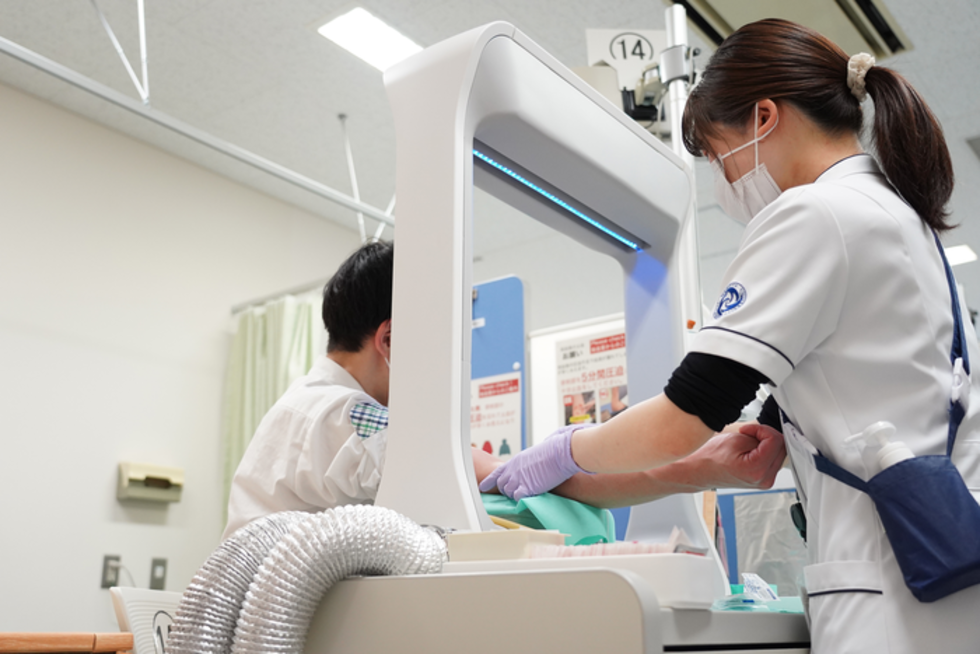
Engineering
May 19, 2022
A new way to combat SARS-CoV-2: Using a desktop-sized air-curtain to inactivate almost 100% of coronavirus particles
There are certain situations where maintaining distance to reduce the spread of COVID-19 is difficult, such as when a doctor takes blood or when someone checks into a hotel. By combining medical and engineering technologies, a team of Nagoya University researchers combined a desktop-sized air-curtain with LEDs to irradiate the virus and allow people to interact in close environments safely.
“Although acrylic sheets are currently widely used as partitions, our air curtain not only blocks, but also deactivates, viruses,” says Professor Tomomi Uchiyama, one of the authors of the study. “Therefore, we expect this device to render acrylic partitions obsolete and become widely used.”
The combination of the two technologies to block exhaled air and inactivate the virus more effectively was the result of a collaboration between Professor Uchiyama and Nobel laureate Professor Hiroshi Amano of the Institute of Materials and Systems for Sustainability (IMaSS) at Nagoya University, and Professor Tetsuya Yagi of the Graduate School of Medicine.
Their new technology, the results of which were published in AIP Advances, combines two ways to combat the virus. First, an air-curtain blocks exhaled air even when someone puts their arm through it. Second, ultraviolet irradiation destroys the outer coat of virus particles. Tests in their laboratory found that this combination of technologies inactivated 99.9% of COVID-19 particles.
To test the technology, the researchers simulated a blood collection booth, which is a situation where the doctor is close to the patient. They tested the device by blowing air containing aerosols towards it, similar to the way many viruses are spread. Then, they tested whether a patient could put their arm through the air curtain without breaking the airflow or making the device less safe. They found that in both situations, the effectiveness of the air curtain was maintained.
The new device also solves the problem of air curtains requiring periodic maintenance to replace filters and remove dust and dirt accumulations. As the device uses LED light instead of a filter, it requires less maintenance. The researchers found that it could be used continuously until the LED burned out, which is more than 10,000 hours of continuous use. This also makes it quiet, which would allow it to be used in commercial facilities such as restaurants, offices, and reception areas where the noise from air filters would be distracting.
This innovation was realized because of the efforts of Nagoya University Hospital, Nagoya Medical Center, Institute of Materials and Systems Sustainability, and Apollo Giken Co. Ltd. The study was supported by the Adaptable and Seamless Technology Transfer Program through Target-driven R&D of the Japan Science and Technology Agency.
The desktop air curtain removes the need for a physical barrier, allowing easy physical contact
between a doctor and patient, for example when drawing blood. (Credit: Junki Mikami)
The paper, “Blocking effect of desktop air curtain on aerosols in exhaled breath,” was published in the journal AIP Advances on May 17, 2022 at DOI: 10.1063/5.0086659.
Authors:
Kotaro Takamure, Yasuaki Sakamoto, Yasumasa Iwatani, Hiroshi Amano, and Tomomi Uchiyama
Media Contact:
Matthew Coslett
International Communications Office, Nagoya University
Email: kouho-en@adm.nagoya-u.ac.jp